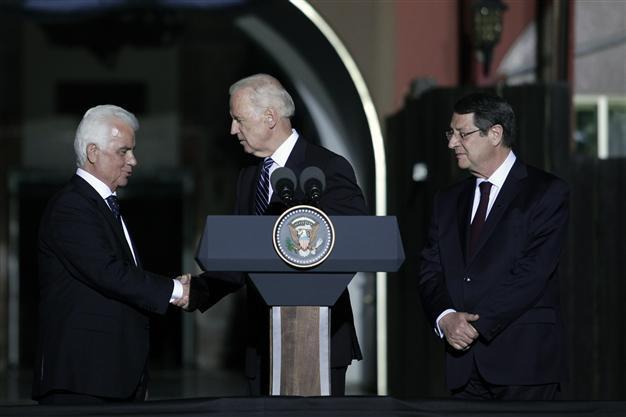Biden hails Cyprus as 'key partner' after reunification talks
NICOSIA - Agence France-Presse

Turkish Cypriot leader Derviş Eroğlu (L) shakes hands with US Vice President Joe Biden as Cypriot President Nicos Anastasiades (R) looks on after a diner in the UN-patrolled Buffer Zone, in Nicosia, May 22. AFP Photo
U.S. Vice President Joe Biden May 23 hailed Cyprus as a "key partner" and said its rival leaders had agreed to "speed up" efforts to end the island's 40-year division.Biden ended his visit, the highest level by a U.S. official to Cyprus since Lyndon B. Johnson in 1962, late on May 22, leaving for the airport after meeting Turkish and Greek Cypriot leaders.
"Cyprus is a key partner in a challenging region, and we know it could be even a stronger partner if the next generation of Cypriots can grow up without the burden of conflict," he said, speaking in the buffer
zone in Nicosia that has split the island and the capital since 1974.
Biden had met with Cypriot President Nicos Anastasiades and Turkish Cypriot leader Derviş Eroğlu separately before dining with them in the U.N.-patrolled buffer zone.
"The two leaders agreed to speed up the process of negotiations towards a comprehensive settlement, which is their priority. They agreed to meet at least twice a month to this end. Their next meeting will be on June 2," he told journalists late on May 22.
Earlier, Biden held talks with Anastasiades, who has overseen an improvement in Washington-Nicosia ties since he took office last year after decades of Greek Cypriot distrust of the United States, a close ally of Turkey.
Biden highlighted the potential role Cyprus could play in the region, particularly on account of its offshore gas reserves, whose exploitation for export to Europe has been hampered by the division and a festering dispute with Turkey.
"Cyprus is poised to become a key player in the Eastern Mediterranean, transforming the Eastern Mediterranean into a new global hub for natural gas and markets," Biden said.
Anastasiades said the vice presidential visit proved the "significant improvement in the partnership between Cyprus and the United States, a partnership which we can now call strategic". He appealed for U.S. support in tapping the island's gas reserves.
U.S. interest in the reserves reaching European markets has been increased by the Ukraine crisis, which has highlighted European dependency on Russian energy supplies.
Assessing the meeting, government spokesman Nicos Christodoulides said Washington had "recognised the role that the Republic of Cyprus can play as an alternative energy corridor, not only for the region but Europe in general."
Visit to northern Nicosia
Biden also crossed the so-called Green Line dividing the island and its capital to meet Eroğlu after reassuring Greek Cypriots that the meeting signalled no change in U.S. policy.
Eroğlu said after the meeting in northern Nicosia that "the time has come for a solution to the Cyprus issue." "We can not proceed by blaming or driving each other into a corner," he said.
Biden said he wanted to lend his support to U.N.-backed reunification talks that the rival Cypriot leaders relaunched in February, but details of a settlement were for them to work out.
Anastasiades has been pushing for major concessions by both sides to build confidence before any referendum on a comprehensive settlement.
In particular, he has been urging the return of the ghost town of Varosha - once the island's premier tourist resort but emptied of its inhabitants and closed by the Turkish army for 40 years.
The vice president said the U.S. was "ready to assist with the implementation" of any plan for the town agreed upon in the future.
Biden also broached the crisis in Ukraine with Anastasiades, and was thought to have pressed Anastasiades not to let the island's close economic ties with Russia get in the way of a united EU response if Moscow interferes with the Ukrainian presidential election on May 25.
The issue of harsher EU sanctions against Moscow is highly sensitive in Nicosia, where Russian investors have deposits worth billions of euros in banks in Cyprus, which was badly hit by the eurozone debt crisis.
















